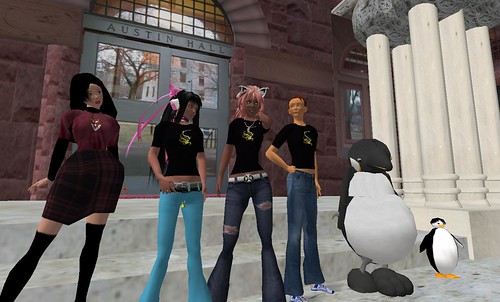The Travails of Foreign Discovery, Part I — Rhode Island
ø
CyberOne course assistant Isaac Meister had this to say about today’s motion hearing in Rhode Island.
Four of us — Joel, Charlie, Matt, and I — drove down to Providence this morning. We were told there would be a hearing on a pending motion by the Plaintiffs to force Judie Tenenbaum to surrender her home computer for it to be imaged. The hearing itself was a rescheduling from the previous December 1 hearing date, a date which the Plaintiffs never told us about.
We found navigating Providence challenging, but eventually found an overpriced lot to park our rental car. At the main courthouse building, we were rebuffed: our hearing would take place in Courtroom A, a room above the post office adjacent. Opposing counsel greeted us warmly and made a point of greeting by name and shaking the hand of every U.S. marshal we passed on our way through security.
Outside the courtroom Joel’s mother Judie, with cookies in tow, and our local counsel, arranged over the weekend, were waiting for us. It was a personal favor: Attorney Miller’s daughter is a friend of Joel’s sister back in Pittsburgh. It had been a while since he had been in federal court, he told us, having last appeared on behalf of asbestos victims in the early 1980s, but he took it very much in stride. A handsome, dignified woman with a notebook and eyeglasses eyed us expectantly, introduced herself as a reporter for the Providence Journal. Joel and Judie were happy to supply background in the lobby as the lawyering contingent moved inside.
As we entered the courtroom the first thing I saw was Judge Almond’s clerk talking excitedly with Mr. Miller, concerned with paperwork. Apparently a re-registration program for the federal Rhode Island District in 2006 had not contacted Mr. Miller, leaving his eligibility to appear in court in doubt. Charlie was to have sought leave to appear pro hac vice for Arthur and Judie, and also to be able to speak on Joel’s behalf, but with our sponsoring attorney’s credentials under fire, it was anyone’s guess as to what Judge Almond would decide.
It turned out that Judge Almond’s standing as a Magistrate Judge made the motion hearing into an exercise in bureaucracy. Judge Almond was stuck in the position of functionary, unable to use the judicial power delegated to him on matters that hadn’t been pre-approved by his colleague Judge Torres. The only issue he was deputized to review was this motion to compel by the Plaintiffs. Deciding the standing of the attorneys before him was outside his ken.
But in order to hold a productive hearing, there must be two represented parties to argue the merits. Mr. Miller’s lack of affirmative re-registration for the federal bar — and it’s worth noting that admission to the federal bar is, at the end of the day, just a courtesy to the state bar — made him ineligible to appear. Charlie, an out-of-stater, had no standing. And so, despite having two lawyers advising her, Judie Tenenbaum was told that properly, she was appearing pro se.
Plaintiffs’ counsel was in a similar situation. Daniel J. Cloherty, local counsel to the Plaintiffs in Boston, had submitted what he thought was the correct documentation to the local clerk’s office, but the papers somehow never made it to Judge Almond. So with four lawyers before the court, only one of them had standing to argue.
No one seemed more frustrated about the situation than Judge Almond. He explained the situation, slumped over to his left, and tossed through the papers the clerk stuck on his dais. But he did turn his scrutiny to the brief before him and noted that this “emergency motion” was now anything but.
All there was to do was set a new time to meet when everyone could confidently state the basis for their standing, and who they were representing. Charlie wanted to appear for Arthur and Judie’s defense — since this little hearing is just one trailing tentacle in the litigation octopus attacking Joel — but also on Joel’s behalf. Another knot through which to work.
The logistical snafu clearly amounted to a victory for Joel and Judie, it became clear. While Judge Almond thought it “possible” that Judie’s failure to oppose the subpoena in the courts immediately might have robbed her of grounds for objection, he emphasized that she needed the opportunity to be heard. And so, in a manner suggesting mechanics more than conviction, local counsel for the plaintiffs made an oral motion requesting that the computer “be preserved”.
Charlie — who, under the fiction of the law, let’s remember, has no standing — ripped him apart. The imputation that the Tenenbaums would choose now of all times to attempt to destroy or damage the computer he found insulting; the fact that “preserving” the contents of a hard drive means the computer cannot be used, the definition of burdensome. And Judge Almond agreed, asking, again, why now?
There was nothing more to do, and we left. It wasn’t quite the show of a full-on motion hearing on the merits of forcing Joel’s parents to give their computer to strangers for inspection, but it was an instructive look at the judicial process choking on its own paperwork.
